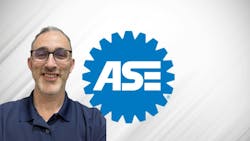Ron Denning: How the industry can fill in the gaps in automotive education
Now in his 25th year of teaching, Ron Denning started out teaching a few CAD classes before adding an engine class to his repertoire. A few years ago, he began teaching an automotive maintenance and repair class for students with no automotive experience. Although his district is currently in the process of building an expanded new facility for automotive education, including launching a new curriculum that will enable students to take new classes and earn ASE certifications in the process, he knows that automotive education as a whole still needs more support from the industry at large.
Q: From your point of view, what would you say is one of the biggest obstacles you face as an instructor?
Denning: Funding. My district is really good about supporting us, but they have limitations. That’s why, with the new program, they’re trying to get industry sponsors to help us out. For example, a local business with a foundation donated a lot of money for our new facility, and that is important because school districts are limited in their local, state, and federal funding. There’s only so much to go around.
If the industry can step up and help out (many already do), it would really benefit districts. It would be great to see even more of that.
Q: How else can the industry step up and fill in the gaps left by the education system?
Denning: If we’re talking about shortcomings and how industry can help, a big issue is finding qualified instructors for school districts, as they’re incredibly hard to find. In our district, specifically in tech ed—not just automotive—we struggle. You get people from the industry who transition into teaching, but even then, it’s tough. If we want real change and more students going into these fields, we need qualified teachers for our schools.
Some counties have tech centers with qualified instructors, but they can only take so many students. More qualified instructors there might open up more opportunities as well, but two counties near us are constantly turning students away. That’s why they’re all in favor of us building this new facility and creating new opportunities.
Q: There has to be some fear that higher ed institutions will look at those program numbers and say, “It’s not worth it anymore.” How do you deal with that?
Denning: That’s another issue. Teachers like me could retire soon; I’m not going to, but I could. Many teachers in these areas delay retirement because they’re afraid the program will die without them. Some schools don’t have these programs anymore, and it’s not because they don’t want them, but because they don’t have anyone to teach them. That’s why I’ll probably keep teaching longer than I planned. I don’t want to see the program disappear.
About the Author
Griffin Matis
Associate Editor | PTEN & Professional Distributor
Griffin Matis is an associate editor for the Vehicle Service & Repair Group. A graduate of the University of Missouri's School of Journalism, Matis works with Professional Tool & Equipment News, Professional Distributor, and VehicleServicePros.com.
Don't miss Matis' next article. Sign up for Professional Distributor or PTEN's weekly newsletter.

